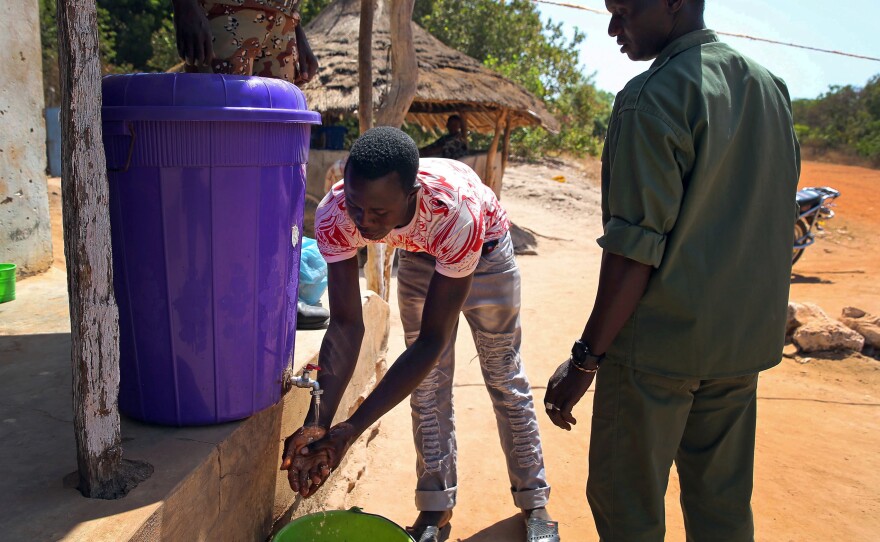Guinea is on high alert. At the international airport, travelers' temperatures are monitored for signs of infection. In the capital city of Conakry, people rarely shake hands and are advised to regularly wash their hands with bleach-diluted water.
This is what life is like nearly three weeks after an outbreak of the deadly Ebola virus.
The World Health Organization has confirmed 157 cases in Guinea, with 101 deaths. Neighboring Liberia has 21 reported cases and 10 deaths. Suspected cases also are being monitored in Sierra Leone and Mali.
WHO described the Ebola outbreak in Guinea as one of the most challenging in the history of the disease because the virus has crossed borders and is in a large capital city, home to two million people. What's more, it's the virulent "Zaire" strain.
There's a lot of fear in Guinea, notes Stéphane Hugonnet, with the WHO Department of Global Preparedness, Surveillance and Response. Hugonnet, who returned to Geneva from southeast Guinea this weekend, says in every Ebola outbreak it's difficult to convince sick people to enter isolation units at a health center.
"The mortality rate is extremely important. Nine out of 10 patients will die. If we look at this from the population's perspective why would you go to a hospital if you have almost a zero chance of getting out of it."
But, he stresses, isolating Ebola victims is one of the most important tactics to stop the spread of the virus.
Guinea's health minister, Remy Lamah, has implored Guineans to remain calm and to ignore rumors that foreign health workers brought Ebola to Guinea. Misinformation is a mighty problem, he says. The virus can be transmitted to humans from wild animals, including fruit bats and monkeys – both of which are culinary delicacies in some parts of Guinea.
Direct human contact with another person's sweat, blood, feces and other bodily fluids, as well as the unprotected handling of infected corpses, can also lead to infection.
Local media are giving blanket coverage to the outbreak. A radio debate included medical personnel, ministers, and ordinary people – as well as one survivor.
"Not everyone dies of Ebola," says Aissata Diallo, a 20-year-old hygienist who has been assisting at a hospital where the international medical charity Doctors Without Borders treats patients. "Yes, of course it's contagious. But there are cases where people get well and go home. That's wonderful. And that makes us happy that people are leaving here alive."
WHO, meanwhile, expects to remain in Guinea for some time.
"Our expectation is that we'll continue to see cases for some number of months," says assistant director-general Keiji Fukuda. "Because we are dealing with Ebola what we typically do is look and make sure that we go through a couple of incubation periods to see if the outbreak is really over."
Copyright 2014 NPR. To see more, visit http://www.npr.org/






